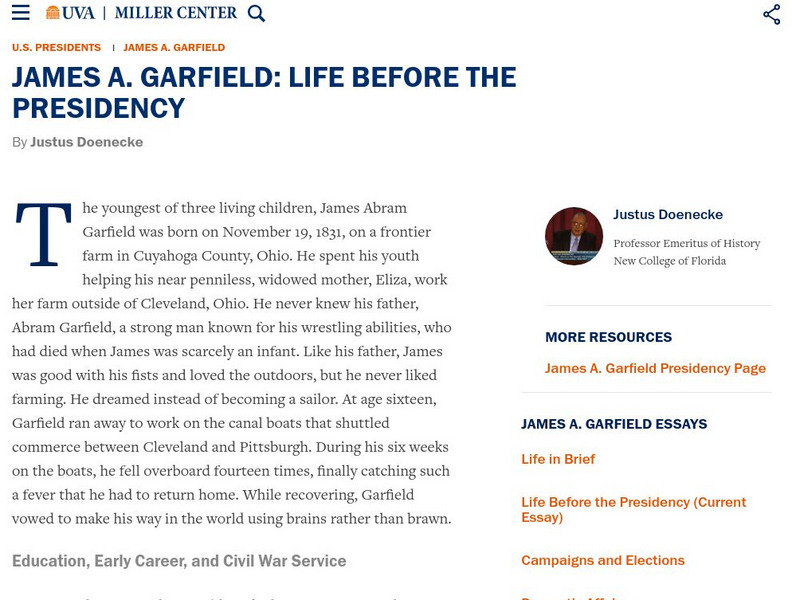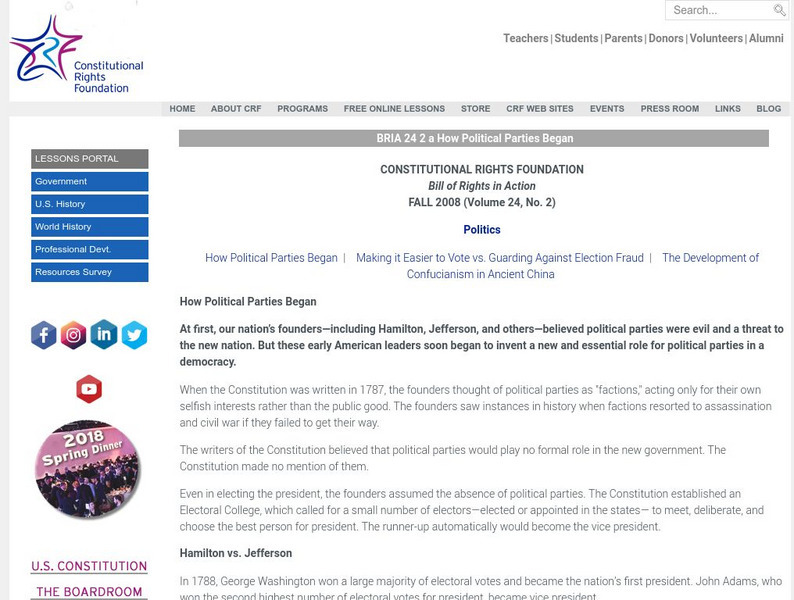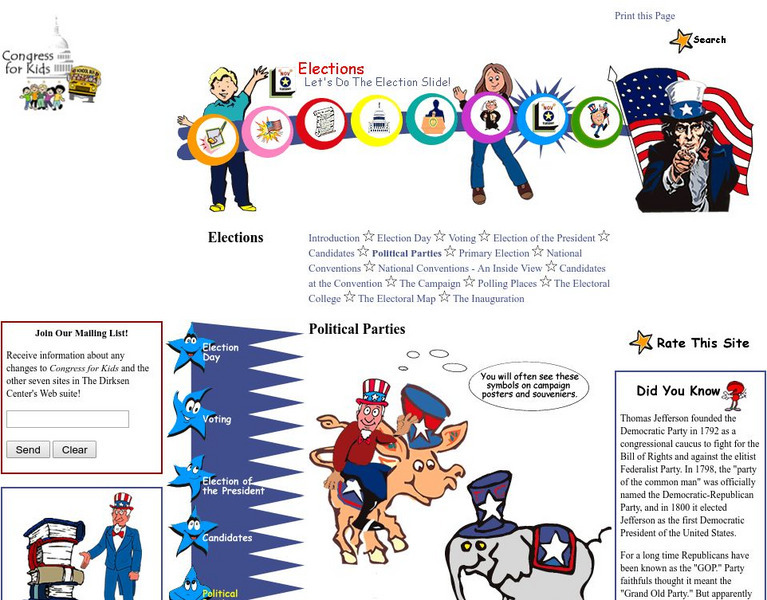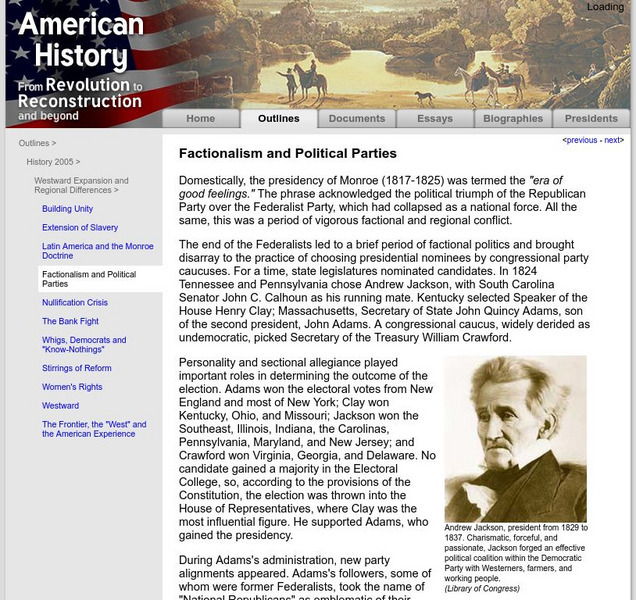Hi, what do you want to do?
Other
University of Delaware: Dept. Of Political Science: The Contract With America
Newt Gingrich, as House Minority Whip, architect of the Contract With America, hoped to make the Republican Party more relevant in the 1990s. Find the text of the contract here including background material of why it was put forward.
University of Virginia
Miller Center at Uva: u.s. Presidents: James Abram Garfield: Life Before the Presidency
James A. Garfield wasn't a president for very long before he was cut down by an assassin, but reading about his political life before his presidency gives a good look at his political life and his political strategy. It also shows the...
Other
Library Company of Philadelphia: Genesis of Republicanism
Exhibition documents the birth and growth of the Grand Old Party during the period from 1854-72. Includes information about the party's early character and issues of consequence that affected its development, including Lincoln's...
Constitutional Rights Foundation
Constitutional Rights Foundation: How Political Parties Began
Activity in which students examine the history of political parties in America and evaluate the role they play and reasons they emerged. Questions for discussion and small group work to compare the late 1700s visions of Republicans and...
Other
Us News and World Report: Teddy Roosevelt, on the Bull Moose Party Ticket
A great explanation of the divide in the Republican Party in the campaign of 1912, which resulted in Theodore Roosevelt becoming a third-party candidate. Read about the vying between two Progressives, one Democratic and one previously...
National Endowment for the Humanities
Neh: Edsit Ement: The First American Party System: Events, Issues, and Positions
In this Curriculum Unit, students will consider "The First American Party System: Events, Issues, and Positions" in 3 Lessons. The unit also includes worksheets and other student materials that can be found under the resource tab.
CNN
Cnn: Democratic Party History
CNN provides a brief account of Democratic party history from the party's origins in the Democratic-Republican party to the present, including information on the era preceding the Civil War.
Siteseen
Siteseen: Government and Constitution: Free Soil Party
This article contains an overview of the history of the Free Soil Party, its leaders, their beliefs, and eventually joined with the National Union Party to form the newly formed Republican Party in 1854.
Alabama Learning Exchange
Alex: Democrat or Republican
During this lesson, students will begin to understand the differences between the two major political parties that exist in the United States of America. Students will have the opportunity to discuss the roles of each presidential...
The Dirksen Congressional Center
Congress for Kids: Elections: Political Parties
Lesson plans on elections and the role of political parties. Find multiple choice quizzes, vocabulary, and a role play of a candidate in a town meeting.
Library of Congress
Loc: Learning Page: Party System
The Library of Congress provides a quick look at the American Party System.
The Dirksen Congressional Center
Congress for Kids: Elections: Political Parties
Read this brief summary of the two political parties in the United States, and then write about what you know about the parties.
Other
National Republican Congressional Committee
The official site of the National Republican Congressional Committee.
Legislative Reference Library of Texas
Legislative Reference Library of Texas: Party Affiliation
A table showing the numbers of Democrats and Republicans in each session of the Texas Legislature since 1870. Clicking on a session brings up a list of all the legislators, with links to their information.
Other
A Brief History of the Two Party System
This site is a web-article on the brief history of the two party system.
PBS
Pbs News Hour: Lesson Plan: The Presidential Nominating System
This lesson may be used to introduce students to the system of primaries and caucuses by which candidates for U.S. president are nominated by their parties. After completing this lesson, students will understand the process by which...
PBS
Pbs News Hour: Lesson: The Presidential Nominating System
This lesson may be used to introduce students to the system of primaries and caucuses by which candidates for U.S. president are nominated by their parties. After completing this lesson, students will understand the process by which...
University of Virginia
Miller Center at Uva: u.s. Presidents: William Mc Kinley: The Campaign and Election of 1896
Read about the campaign of 1896 in which William McKinley represented the Republican Party and William Jennings Bryan the Democratic Party. One big issue was the contrast between the use of the gold standard as opppsed to free silver.
PBS
Pbs: American Experience: Mark Hanna
A brief biography of Republican Party "kingmaker," Mark Hanna, who was primarily responsible for the candidacy of William McKinley in the election of 1896.
University of Groningen
American History: Outlines: Factionalism and Political Parties
Find out about the rise of regionalism and factionalism in the development of political parties involved in the elections of 1824 and 1828.
Ohio State University
Temperance & Prohibition: Prohibition Party Cartoons
A great collection of political cartoons from the Prohibition Party which heaped criticism on both the Republican and Democratic parties concerning their lack of support for prohibition. Find out when the Prohibition Party was at its...
University of Groningen
American History: Essays: The American Whig Party (1834 1856)
This article presents the second part of the history of the Whig Party to find out why the issue of slavery brought about its demise.
Other
Woodrow Wilson Presidential Library: 1916 Election
Here is a multi-faceted look at the election of 1916. Read about the politics of the Democratic and Republican Parties and the results of the election. Also, find out about the interests of immigrants, women, African-Americans, and...
PBS
Pbs Learning Media: Woodrow Wilson: Win the Election of 1912
In this interactive feature, you'll get the chance to form your own political party and try your hand at winning the Presidential Election of 1912. The election of 1912 featured four candidates: Woodrow Wilson, William Howard Taft,...
Other popular searches
- Democratic Republican Party
- Democratic Republican Party
- History of Republican Party
- Modern Day Republican Party
- Republican Party Formation
- Slavery Republican Party
- Republican Party Civil War























